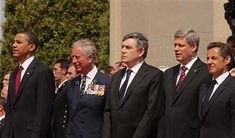 Today, two of my colleagues, former senior MoD official Nick Witney and US analyst Jeremy Shapiro, issued a hard-hitting report about transatlantic relationships. Their message is simple. Europe has the US president it wished for, but Barack Obama lacks the strong transatlantic partner he desired.
Today, two of my colleagues, former senior MoD official Nick Witney and US analyst Jeremy Shapiro, issued a hard-hitting report about transatlantic relationships. Their message is simple. Europe has the US president it wished for, but Barack Obama lacks the strong transatlantic partner he desired.
With EU leaders heading to Washington for their transatlantic summit on 3 November, Shapiro and Witney caution European governments: an unsentimental President Obama has already lost patience with a Europe lacking coherence and purpose. In a post-American world, the United States knows it needs effective partners. And if Europe cannot step up, the US will look for other privileged partners to do business with.
Unfortunately, many Europeans are in denial about how the world is changing. They sense their increasing marginalisation yet “cling to the outdated belief that they remain dependent on the US for their security.” They make a fetish out of the transatlantic relationship, anxiously pursuing harmony for harmony’s sake without questioning what it is good for. As Nick Witney puts it:
“Europeans know they should present a more united front to Russia and China. But the very idea of ‘ganging up’ on the US seems somehow indecent. Seen from Washington, they just look weak and divided.”
A large majority of EU states still believe they enjoy a “special relationship” with the US and compete for access and favour. This notion of everyone having some form of “special relationship” with the US fatuous and it is based on a notion that the transatlantic relationship remains Washington’s dominant foreign policy paradigm.
The conclusion: that the US would prefer a more united EU, but expects so little that it cannot bring itself to greatly care. When the EU is hard-headed, as with trade negotiations, the US listens; when it is not, Europeans are asking to be divided and ruled. Thankfully, the authors avoid calling for more summits, forums and dialogues. Europeans fail to understand how annoyed the US is with ongoing ‘consultations’ rather than actually doing business.
Shapiro and Witney urge Europeans to develop a more assertive approach to the United States – based on the defence of European interests rather than nostalgia. They suggest how this could work in practice:
First, develop a European strategy for Afghanistan. Europe needs to determine exactly what it wants and needs from Afghanistan, not what it thinks the US wants or needs. They should then either scale up their commitment or withdraw. Second, take responsibility for Russia. Europe should not wait to be told what to do by the US, but Europeans themselves should decide whether a higher NATO profile is needed in central and eastern Europe. Finally, Europe should act in the Middle East. European countries have the economic clout to pressurise Iran over its nuclear ambitions. They need to recognise that power and use it.






Comments